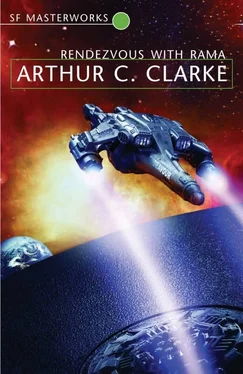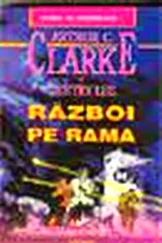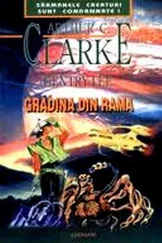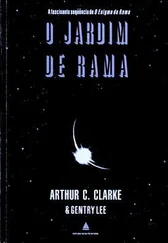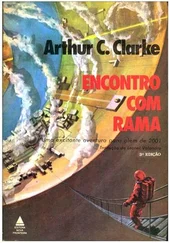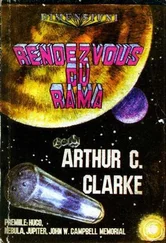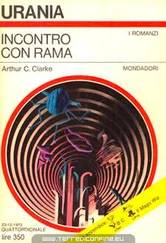“Dr. Perera, I believe you have some comments to make?”
Ambassador Bose wondered briefly if he should have first given the floor to Professor Davidson, as senior scientist and the only astronomer. But the old cosmologist still seemed to be in a mild state of shock, and was clearly out of his element. All his professional career he had looked upon the universe as an arena for the titanic impersonal forces of gravitation, magnetism, radiation; he had never believed that life played an important role in the scheme of things, and regarded its appearance on Earth, Mars and Jupiter as an accidental aberration.
But now there was proof that life not only existed outside the solar system, but had scaled heights far beyond anything that man had achieved, or could hope to reach for centuries to come. Moreover, the discovery of Rama challenged another dogma that Professor Olaf had preached for years. When pressed, he would reluctantly admit that life probably did exist in other star systems—but it was absurd, he had always maintained to imagine that it could ever cross the interstellar gulfs…
Perhaps the Ramans had indeed failed, if Commander Norton was correct in believing that their world was now a tomb. But at least they had attempted the feat, on a scale which indicated a high confidence in the outcome. If such a thing had happened once, it must surely have happened many times in this Galaxy of a hundred thousand million suns… and someone, somewhere, would eventually succeed.
This was the thesis which, without proof but with considerable arm-waving, Dr. Carlisle Perera had been preaching for years. He was now a very happy man, though also a most frustrated one. Rama had spectacularly confirmed his views but he could never set foot inside it, or even see it with his own eyes. If the devil had suddenly appeared and offered him the gift of instantaneous teleportation, he would have signed the contract without bothering to look at the small print.
“Yes, Mr. Ambassador, I think I have some information of interest. What we have here is undoubtedly a “Space Ark”. It’s an old idea in the astronautical literature; I’ve been able to trace it back to the British physicist J. D. Bernal, who proposed this method of interstellar colonization in a book published in 1929—yes, two hundred years ago. And the great Russian pioneer Tsiolkovski put forward somewhat similar proposals even earlier.”
“If you want to go from one star system to another you have a number of choices. Assuming that the speed of light is an absolute limit—and that’s still not completely settled, despite anything you may have heard to the contrary”—there was an indignant sniff, but no formal protest from Professor Davidson—“you can make a fast trip in a small vessel, or a slow journey in a giant one.”
“There seems no technical reason why spacecraft cannot reach ninety per cent, or more, of the speed of light. That would mean a travel time of five to ten years between neighbouring stars—tedious, perhaps, but not impracticable, especially for creatures whose life spans might be measured in centuries. One can imagine voyages of this duration, carried out in ships not much larger than ours.”
“But perhaps such speeds are impossible, with reasonable payloads; remember, you have to carry the fuel to slow down at the end of the voyage, even if you’re on a one-way trip. So it may make more sense to take your time—ten thousand, a hundred thousand years…”
“Bernal and others thought this could be done with mobile worldlets a few kilometres across, carrying thousands of passengers on journeys that would last for generations. Naturally, the system would have to be rigidly closed, recycling all food, air and other expendables. But, of course, that’s just how the Earth operates—on a slightly larger scale.”
“Some writers suggested that these Space Arks should be built in the form of concentric spheres; others proposed hollow, spinning cylinders so that centrifugal force could provide artificial gravity—exactly what we’ve found in Rama—”
Professor Davidson could not tolerate this sloppy talk. “No such thing as centrifugal force. It’s an engineer’s phantom. There’s only inertia.”
“You’re quite right, of course,” admitted Perera, “though it might be hard to convince a man who’d just been slung off a carousel. But mathematical rigour seems unnecessary—”
“Hear, hear,” interjected Dr. Bose, with some exasperation. “We all know what you mean, or think we do. Please don’t destroy our illusions.”
“Well, I was merely pointing out that there’s nothing conceptually novel about Rama, though its size is startling. Men have imagined such things for two hundred years.”
“Now I’d like to address myself to another question. Exactly how long has Rama been travelling through space?”
“We now have a very precise determination of its orbit and its velocity. Assuming that it’s made no navigational changes, we can trace its position back for millions of years. We expected that it would be coming from the direction of a nearby star—but that isn’t the case at all.”
“It’s more than two hundred thousand years since Rama passed near any star, and that particular one turns out to be an irregular variable—about the most unsuitable sun you could imagine for an inhabited solar system. It has a brightness range of over fifty to one; any planets would be alternately baked and frozen every few years.”
“A suggestion,” put in Dr. Price. “Perhaps that explains everything. Maybe this was once a normal sun and became unstable. That’s why the Ramans had to find a new one.”
Dr. Perera admired the old archaeologist, so he let her down lightly. But what would she say, he wondered, if he started pointing out the instantly obvious in her own speciality…
“We did consider that,” he said gently. “But if our present theories of stellar evolution are correct, this star could never have been stable—could never have had life-bearing planets. So Rama has been cruising through space for at least two hundred thousand years, and perhaps for more than a million.”
“Now it’s cold and dark and apparently dead, and I think I know why. The Ramans may have had no choice—perhaps they were indeed fleeing from some disaster—but they miscalculated.”
“No closed ecology can be one hundred per cent efficient; there is always waste, loss—some degradation of the environment, and build-up of pollutants. It may take billions of years to poison and wear out a planet—but it will happen in the end. The oceans will dry up, the atmosphere will leak away…”
“By our standards, Rama is enormous—yet it is still a very tiny planet. My calculations, based on the leakage through its hull, and some reasonable guesses about the rate of biological turnover, indicate that its ecology could only survive for about a thousand years. At the most, I’ll grant ten thousand…”
“That would be long enough, at the speed Rama is travelling, for a transit between the closely-packed suns in the heart of the Galaxy. But not out here, in the scattered population of the spiral arms. Rama is a ship which exhausted its provisions before it reached its goal. It’s a derelict, drifting among the stars.”
“There’s just one serious objection to this theory, and I’ll raise it before anybody else does. Rama’s orbit is aimed so accurately at the solar system that coincidence seems ruled out. In fact, I’d say it’s now heading much too close to the sun for comfort: Endeavour will have to break away long before perihelion, to avoid overheating.”
“I don’t pretend to understand this. Perhaps, there may be some form of automatic terminal guidance still operating, steering Rama to the nearest suitable star ages after its builders are dead.”
Читать дальше
